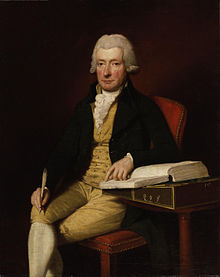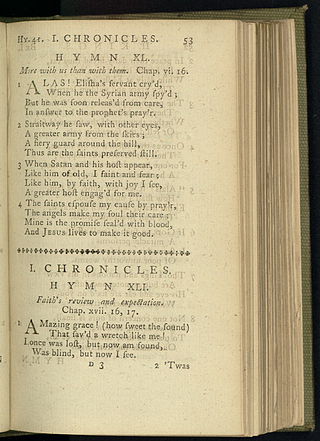
"Amazing Grace" is a Christian hymn published in 1779, written in 1772 by English Anglican clergyman and poet John Newton (1725–1807). It is an immensely popular hymn, particularly in the United States, where it is used for both religious and secular purposes.
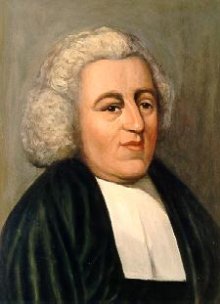
John Newton was an English evangelical Anglican cleric and slavery abolitionist. He had previously been a captain of slave ships and an investor in the slave trade. He served as a sailor in the Royal Navy and was himself enslaved for a time in West Africa. He is noted for being author of the hymns Amazing Grace and Glorious Things of Thee Are Spoken.
The Olney Hymns were first published in February 1779 and are the combined work of curate John Newton (1725–1807) and his poet friend William Cowper (1731–1800). The hymns were written for use in Newton's rural parish, which was made up of relatively poor and uneducated followers. The Olney Hymns are an illustration of the potent ideologies of the Evangelical movement, to which both men belonged, present in many communities in England at the time.

William Cowper was an English poet and Anglican hymnwriter.

A hymnal or hymnary is a collection of hymns, usually in the form of a book, called a hymnbook. They are used in congregational singing. A hymnal may contain only hymn texts ; written melodies are extra, and more recently harmony parts have also been provided.
"Old 100th" or "Old Hundredth" is a hymn tune in long metre, from the second edition of the Genevan Psalter. It is one of the best known melodies in many occidental Christian musical traditions. The tune is usually attributed to the French composer Louis Bourgeois.

A metrical psalter is a kind of Bible translation: a book containing a verse translation of all or part of the Book of Psalms in vernacular poetry, meant to be sung as hymns in a church. Some metrical psalters include melodies or harmonisations. The composition of metrical psalters was a large enterprise of the Protestant Reformation, especially in its Calvinist manifestation.
Decisions concerning the conduct of public worship in the Church of Scotland are entirely at the discretion of the parish minister. As a result, a wide variety of musical resources are used. However, at various times in its history, the General Assembly has commissioned volumes of psalms and hymns for use by congregations.
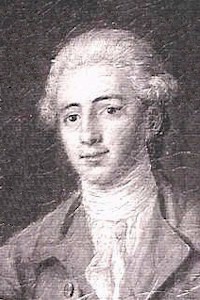
"All Hail the Power of Jesus' Name" is a Christian hymn.
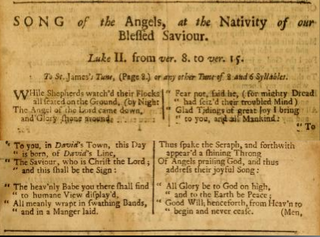
"While shepherds watched their flocks" is a traditional Christmas carol describing the Annunciation to the Shepherds, with words attributed to Irish hymnist, lyricist and England's Poet Laureate Nahum Tate. It is listed as number 936 in the Roud Folk Song Index.
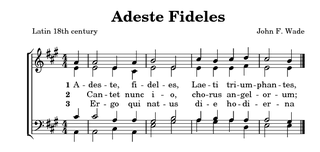
A hymn tune is the melody of a musical composition to which a hymn text is sung. Musically speaking, a hymn is generally understood to have four-part harmony, a fast harmonic rhythm, with or without refrain or chorus.
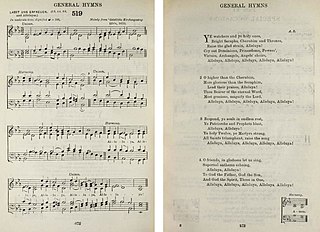
"Ye Watchers and Ye Holy Ones" is a popular Christian hymn with text by Athelstan Riley, first published in the English Hymnal (1906). It is sung to the German tune Lasst uns erfreuen (1623). Its uplifting melody and repeated "Alleluias" make this a favourite Anglo-Catholic hymn during the Easter season, the Feast of All Saints, and other times of great rejoicing.

"Glorious Things of Thee Are Spoken", also called "Zion, or the City of God", is an 18th-century English hymn written by John Newton, who also wrote the hymn "Amazing Grace". Shape note composer Alexander Johnson set it to his tune "Jefferson" in 1818, and as such it has remained in shape note collections such as the Sacred Harp ever since. However, the hymn is most often set to the tune of Joseph Haydn's "Gott erhalte Franz den Kaiser". In recent decades it has been sometimes replaced by "Abbot's Leigh". This was written for this text by Cyril Vincent Taylor in 1942 while he was a producer of Religious Broadcasting at the BBC and stationed at the village of Abbots Leigh. Multiple other tunes have also been used with the hymn.

"All Creatures of Our God and King" is an English Christian hymn by William Henry Draper, based on a poem by St. Francis of Assisi. It was first published in a hymn book in 1919.

"Praise, my soul, the King of heaven" is a Christian hymn. Its text, which draws from Psalm 103, was written by Anglican divine Henry Francis Lyte. First published in 1834, it endures in modern hymnals to a setting written by John Goss in 1868, and remains one of the most popular hymns in English-speaking denominations.

"Lasst uns erfreuen herzlich sehr" is a hymn tune that originated from Germany in 1623, and which found widespread popularity after The English Hymnal published a 1906 version in strong triple meter with new lyrics. The triumphant melody and repeated "Alleluia" phrases have supported the tune's widespread usage during the Easter season and other festive occasions, especially with the English texts "Ye Watchers and Ye Holy Ones" and "All Creatures of Our God and King".

"Es woll uns Gott genädig sein" is a Lutheran hymn, with words written by Martin Luther based on the Psalm 67. The hymn in three stanzas of nine lines each was first published in Wittenberg in 1524. Its best known hymn tune, Zahn No. 7247, was published in Strasbourg in 1524. Heinrich Schütz and Johann Sebastian Bach wrote settings of the hymn. It was translated to English and has appeared in dozens of hymnals.

"Breathe on Me, Breath of God" is an English Christian hymn. It was written by Edwin Hatch, a Church of England vicar and the Professor of Classics at the University of Trinity College in Canada. It was first published privately in 1878 and publicly published in 1886.

"In dich hab ich gehoffet, Herr" is a Lutheran hymn in seven stanzas, written by Adam Reusner and first published in 1533. He paraphrased the beginning of Psalm 31. It was first sung to the melody of a Passion hymn. The melody connected with the hymn in 1560 was derived from models dating back to the 14th century. A third melody from 1608 became a hymn tune for several other songs and translations to English. In the German Protestant hymnal Evangelisches Gesangbuch, the hymn appears as EG 257 with the second melody. Johann Sebastian Bach used the second and third melodies in chorale preludes, and the third also in cantatas and the St Matthew Passion.
